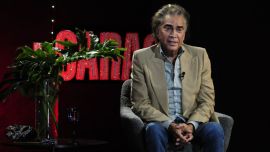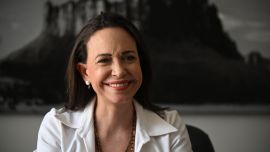Ever since his entry into mainstream, from his appearances on television shows to the day he was sworn-in as President, Javier Milei has always expressed himself against state intervention. Taking aim particularly at subsidies for public services, he has repeatedly vowed to slash spending on them since becoming head of state.
However, a journalistic investigation has revealed that members of the President's own family benefitted from millions of dollars in subsidies. Reporters with local outlets DiarioAr and La Nación have now revealed that the bus companies were part-owned by the head of state’s father, Norberto Milei, received huge payments during the years the Kirchnerite governments were in power.
"What did I do? I went to Papa ... to Adam Smith, not to you. You and your business deals, what are you doing?!” said Milei ironically last month during a Luna Park rally. The President was referring to the famed economist who is the "father of liberalism" and not his progenitor sitting in the front row.
Norberto Horacio Milei, today aged 81, is a businessman from the passenger transport sector who sold his shares in the firms over 10 years ago. He began his working life as a bus-driver and by the 1970s had managed to buy his own vehicle. In time he came to be the president of and a shareholder in two companies/; Rocaraza SA and Teniente General Roca SA.
Through those firms, ‘Beto’ Milei (as he was known in the trade) received at least US$33 million from the state between 2005 and 2007 during the Néstor Kirchner presidency, an investigation by DiarioAr and La Nación, co-ordinated by the CLIP (Centro Latinoamericano de Investigación Periodística) regional investigative journalism centre, has revealed.
At a time when Ricardo Jaime was Transport secretary, Milei Senior’s companies figure among hundreds of spreadsheets published in official websites with details of state assistance in the framework of the economic difficulties following the crisis of 2001.
The transport subsidies began during the presidency of Eduardo Duhalde after the turbulent exit of Fernando de La Rúa and a succession of several presidents in a few days. But the sheer amount of cash dedicated to subsidies entered "another dimension under Néstor Kirchner," maintains the report.
Teniente General Roca called in the receivers in 2002 under a City commercial court. By 2005 an agreement to pay off its debts, while receiving millions in state assistance, had already been signed. Furthermore, the balance sheets of the companies showed that they had received subsidies in smaller sums than informed by Jaime’s department.
The documentation shows the companies headed by the father of the founder of La Libertad Avanza had a fleet of 115 buses and operated the lines 21, 31, 108 and 146.
Of the US$33 million received, the companies in question declared US$10 million and it is not known where the rest of that money went, mentioned the journalistic sources.
The investigation states that the Transport Ministry was asked for more complete information on the money given to these companies between 2002 and 2014 but no response was obtained.
In a document of the annual general meeting of October 2006, figuring in the Official Gazette, Norberto Milei appears as the president of Teniente General Roca SA. In another document dating from 2008, there is already a different board of directors because the current President’s father had sold his shares to Grupo Dota.
That document further affirms that Norberto Milei had become a real-estate businessman and farmer after selling his businesses. It also highlights that once retired, he aided his children economically, expanding his business with investments in the United States.
In the case of Karina Milei, she received a flat of 150 square metres in the northern suburb of Vicente López as an advance inheritance, according to the sworn statement of the current presidential chief-of-staff.
On his side Milei acquired a black Ford Ecosport 2.0, model 2005 with his father’s money. He later sold it and bought a coupé Peugeot RCZ, adding money of his own.
In his statement to the Anti-Corruption Office, he says that he acquired it in 2013 with “his own funds,” concludes the report.
– TIMES/PERFIL
























Comments